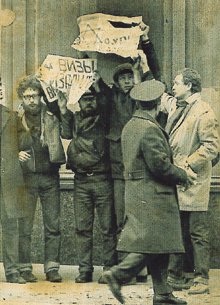Human rights in the Soviet Union
== Human rights in the Soviet Union ==
Human rights in the Soviet Union were a contentious issue, with numerous reports of violations throughout its existence from 1922 to 1991. The Soviet government, under the control of the Communist Party, maintained strict control over many aspects of life, leading to widespread abuses and restrictions on freedoms.
Political Repression[edit | edit source]
The Soviet Union was known for its political repression, particularly during the rule of Joseph Stalin. The Great Purge of the 1930s saw the execution and imprisonment of millions of people, including Bolsheviks, intellectuals, and ordinary citizens accused of being counter-revolutionaries. The NKVD, the Soviet secret police, played a significant role in these purges.
Freedom of Speech and Press[edit | edit source]
Freedom of speech and the press were severely restricted in the Soviet Union. The government controlled all media outlets, and dissenting voices were often silenced through imprisonment or exile. Samizdat, the clandestine copying and distribution of literature banned by the state, became a method for dissidents to share information and ideas.
Religious Persecution[edit | edit source]
The Soviet government promoted state atheism and persecuted religious groups. Churches, mosques, and synagogues were closed or destroyed, and religious leaders were often arrested or executed. Despite this, many citizens continued to practice their faith in secret.
Forced Labor Camps[edit | edit source]
The Gulag system was a network of forced labor camps where millions of people were imprisoned under harsh conditions. Prisoners included political dissidents, criminals, and ordinary citizens caught up in the purges. The camps were notorious for their brutal treatment and high mortality rates.
Ethnic Discrimination[edit | edit source]
Ethnic minorities in the Soviet Union faced discrimination and repression. Policies of Russification aimed to assimilate non-Russian populations, and many ethnic groups were forcibly relocated. The Holodomor, a man-made famine in Ukraine, is considered by some historians to be an act of genocide against the Ukrainian people.
Dissident Movement[edit | edit source]
The dissident movement in the Soviet Union emerged in the 1960s and 1970s, with individuals and groups advocating for human rights and political reform. Notable dissidents included Andrei Sakharov, a physicist and Nobel Peace Prize laureate, and Aleksandr Solzhenitsyn, an author who exposed the horrors of the Gulag system.
International Response[edit | edit source]
The international community often condemned the Soviet Union for its human rights abuses. Organizations such as Amnesty International and Human Rights Watch documented violations and advocated for the release of political prisoners. The Helsinki Accords of 1975, which included commitments to respect human rights, provided a framework for international pressure on the Soviet government.
See also[edit | edit source]
- Communist Party of the Soviet Union
- Great Purge
- NKVD
- Samizdat
- State atheism
- Gulag
- Russification
- Holodomor
- Dissident movement in the Soviet Union
- Andrei Sakharov
- Aleksandr Solzhenitsyn
- Amnesty International
- Human Rights Watch
- Helsinki Accords
References[edit | edit source]
External links[edit | edit source]
Search WikiMD
Ad.Tired of being Overweight? Try W8MD's physician weight loss program.
Semaglutide (Ozempic / Wegovy and Tirzepatide (Mounjaro / Zepbound) available.
Advertise on WikiMD
|
WikiMD's Wellness Encyclopedia |
| Let Food Be Thy Medicine Medicine Thy Food - Hippocrates |
Translate this page: - East Asian
中文,
日本,
한국어,
South Asian
हिन्दी,
தமிழ்,
తెలుగు,
Urdu,
ಕನ್ನಡ,
Southeast Asian
Indonesian,
Vietnamese,
Thai,
မြန်မာဘာသာ,
বাংলা
European
español,
Deutsch,
français,
Greek,
português do Brasil,
polski,
română,
русский,
Nederlands,
norsk,
svenska,
suomi,
Italian
Middle Eastern & African
عربى,
Turkish,
Persian,
Hebrew,
Afrikaans,
isiZulu,
Kiswahili,
Other
Bulgarian,
Hungarian,
Czech,
Swedish,
മലയാളം,
मराठी,
ਪੰਜਾਬੀ,
ગુજરાતી,
Portuguese,
Ukrainian
Medical Disclaimer: WikiMD is not a substitute for professional medical advice. The information on WikiMD is provided as an information resource only, may be incorrect, outdated or misleading, and is not to be used or relied on for any diagnostic or treatment purposes. Please consult your health care provider before making any healthcare decisions or for guidance about a specific medical condition. WikiMD expressly disclaims responsibility, and shall have no liability, for any damages, loss, injury, or liability whatsoever suffered as a result of your reliance on the information contained in this site. By visiting this site you agree to the foregoing terms and conditions, which may from time to time be changed or supplemented by WikiMD. If you do not agree to the foregoing terms and conditions, you should not enter or use this site. See full disclaimer.
Credits:Most images are courtesy of Wikimedia commons, and templates Wikipedia, licensed under CC BY SA or similar.
Contributors: Prab R. Tumpati, MD


